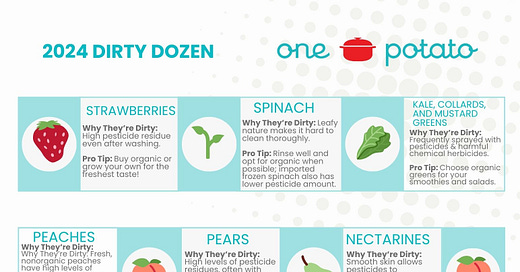The Dirty Dozen: Most Contaminated Fruits and Vegetables
These are the fruits and veggies with higher pesticide residues to keep in mind when shopping for produce.
Hey there, One Potato Community! Remember the Clean 15? On the flipside, the Environmental Working Group shares the Dirty Dozen - a list of fruits and veggies that tend to have the highest pesticide residues. These are the ones you might want to buy organic to keep your meals as clean as possible. The Dirty Dozen features produce that is more heavily treated with pesticides, leafy produce that can be harder to wash, and produce that has thinner skin allowing pesticides to penetrate. Of course, whether buying organic or conventional fruits and veggies, always wash your produce thoroughly. Here’s a link to a graphic of the Dirty Dozen you can print out and keep on your fridge as a reminder.
Ready to dig in? Let’s go!
1. Strawberries 🍓
Why They’re Dirty: High pesticide residue even after washing.
Watch Out: These delicate fruits are super vulnerable to pests, making it a pesticide-intensive crop, with a variety and toxicity level of chemicals used.
Pro Tip: Buy organic or grow your own for the freshest taste!
2. Spinach 🌱
Why They’re Dirty: Leafy nature makes it hard to clean thoroughly.
Watch Out: Has been found to have the highest pesticide residues by weight, and is often found with pesticide residues even after washing.
Pro Tip: Rinse well and opt for organic when possible; imported frozen spinach also has lower pesticide amount.
3. Kale, Collards, and Mustard Greens 🥬
Why They’re Dirty: Frequently sprayed with pesticides and harmful chemical herbicides.
Watch Out: Found to carry residues of harmful chemicals like herbicide DCPA (a.k.a. Dacthal), which was identified as a possible human carcinogen in the mid-90s, and has been banned in Europe since 2009.
*Breaking News* The EPA issued an “Emergency Stop Use” order of Dacthal on August 6th, 2024. You can read more about it on the EPA announcement page.
Pro Tip: Choose organic greens for your smoothies and salads.
4. Peaches 🍑
Why They’re Dirty: Fresh, nonorganic peaches have high levels of contamination due to multiple pesticide treatments
Watch Out: The chemicals found on peaches include fungicides and residues of neonicotinoids.
Pro Tip: Organic peaches are a safer, sweeter choice.
5. Pears 🍐
Why They’re Dirty: High levels of pesticide residues, often with multiple chemicals.
Watch Out: The skin can absorb pesticide more easily, making them hard to wash off.
Pro Tip: Peel them or go organic to enjoy them safely.
6. Nectarines 🍑
Why They’re Dirty: Smooth skin allows pesticides to penetrate easily.
Watch Out: Heavy contamination from multiple pesticide treatments.
Pro Tip: Organic nectarines are worth the extra cost.
7. Apples 🍏
Why They’re Dirty: Although treated with fewer pesticides than many crops on this list, they’re one of the most pesticide-laden fruits.
Watch Out: Treated with chemicals to prevent pests and increase shelf life after harvesting.
Pro Tip: Organic apples make a crunchy, clean snack, and stick to non-GMO apple varieties.
8. Grapes 🍇
Why They’re Dirty: Sprayed multiple times during growth, especially imported ones.
Watch Out: High residue levels, including pesticides not approved in the U.S.
Pro Tip: Wash well and buy organic grapes (and raisins), especially for kids.
9. Bell and Hot Peppers 🌶️
Why They’re Dirty: Complex surface traps pesticides.
Watch Out: These pesticides can leave hard to remove residues even with thorough washing.
Pro Tip: Organic peppers are your best bet for fajitas and stir-fries.
10. Cherries 🍒
Why They’re Dirty: Heavily sprayed with pesticides.
Watch Out: Small size and smooth skin allow easy absorption.
Pro Tip: Savor organic fresh cherries for a safer, sweet treat when in season, or look for frozen, US domestic, organic cherries.
11. Blueberries 🫐
Why They’re Dirty: Treated with a variety of pesticides.
Watch Out: Retain high levels of pesticide residues even after washing.
Pro Tip: Add organic blueberries to your breakfast bowl after thoroughly washing.
12. Green Beans 🫛
Why They’re Dirty: Frequently treated to prevent insect damage.
Watch Out: Pesticide residues remain even after washing or cooking.
Pro Tip: Steam organic green beans for a healthy side dish.
Make Informed Choices!
Keeping an eye on the Dirty Dozen helps you make healthier choices for your family. Remember, buying organic can reduce your pesticide exposure. Happy, healthy cooking! 🌱🍽️
Source: Food Revolution Network





